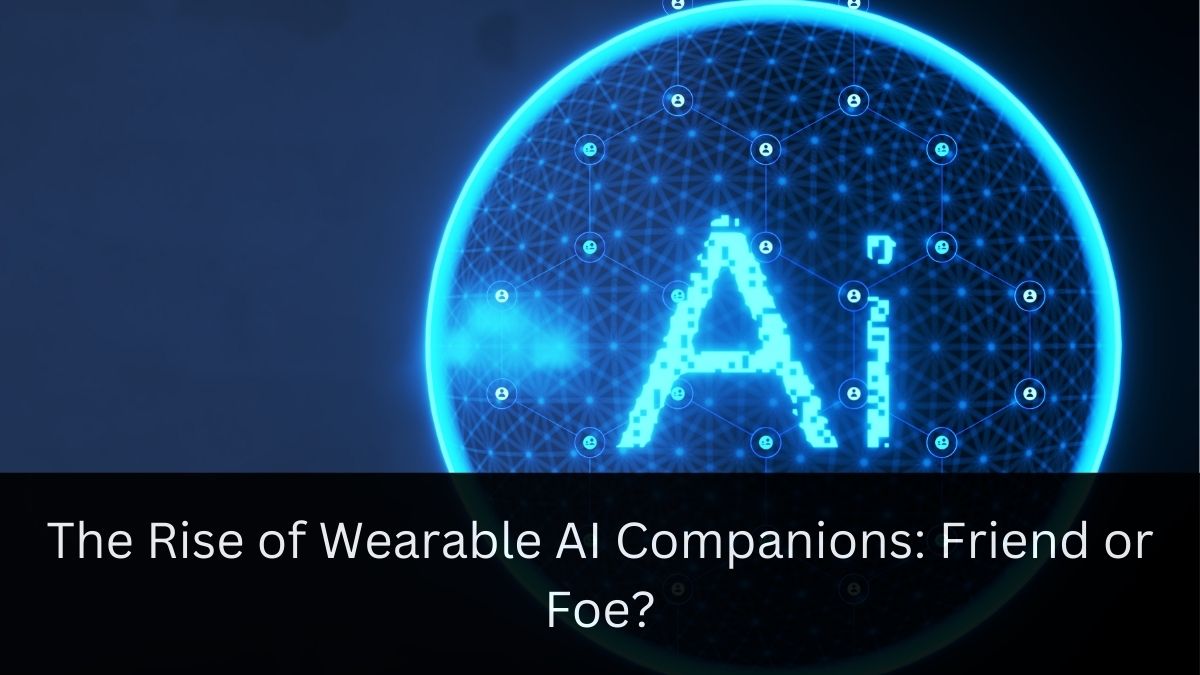AI
The Rise of Wearable AI Companions: Friend or Foe?

In an era where technology increasingly intertwines with our daily lives, a new player has entered the scene: the AI companion wearable. At the forefront of this emerging trend is Avi Schiffmann’s “Friend,” a device that promises to revolutionize how we interact with artificial intelligence. But as with any technological leap, it raises questions about privacy, human connection, and the nature of friendship itself.
The Birth of a New Companion
Meet Your New Best Friend
Imagine a world where your closest confidant is always with you, hanging around your neck like a modern-day amulet. This is the vision Avi Schiffmann, a 21-year-old tech prodigy, has brought to life with his latest creation, simply called “Friend.” This small, puck-shaped device is more than just a gadget; it’s an AI-powered companion designed to listen, respond, and evolve alongside its user.
As someone who’s often found comfort in late-night chats with chatbots, I can’t help but be intrigued by the concept. The idea of having a non-judgmental ear always available is undeniably appealing, especially in our increasingly isolated world.
Beyond Productivity: A Focus on Connection
Unlike its predecessors in the wearable AI market, Friend doesn’t aim to boost productivity or replace your smartphone. Instead, it focuses solely on companionship. “Productivity is over, no one cares,” Schiffmann boldly declares. In a world obsessed with optimization, this shift towards emotional connection is refreshing and, perhaps, necessary.
The Technical Marvel
Always Listening, Always Learning
At the heart of Friend is its “always listening” feature, powered by Anthropic AI’s Claude 3.5 large language model. This allows the device to engage in spontaneous conversation, offer encouragement, or even playfully tease its wearer. With a battery life of about 15 hours, Friend aims to be a constant presence in its user’s life.
The design, a collaboration with Bould (the company behind Nest thermostats), is sleek and reminiscent of the colorful first-generation iMacs. It’s a nostalgic nod that might resonate with millennials like myself who grew up during the dawn of personal computing.
The Mind Behind the Machine
Avi Schiffmann: Wunderkind Turned AI Innovator
Schiffmann’s journey to creating Friend is as fascinating as the device itself. At just 17, he gained international recognition for developing a global COVID-19 tracking website. His subsequent efforts to assist Ukrainian refugees further cemented his reputation as a tech visionary with a humanitarian bent.
Now, with Friend, Schiffmann is venturing into uncharted territory. His transition from creating tools for global crises to developing an AI companion reflects a broader shift in tech priorities – from solving world problems to addressing personal, emotional needs.
The Promise and Perils of AI Companionship
A Balm for Loneliness or a Band-Aid Solution?
The potential benefits of Friend are clear. In a world where 61% of young people report feeling seriously lonely, according to Professor Jodi Halpern of UC Berkeley, an always-available companion could provide much-needed emotional support. As someone who’s experienced the isolating effects of remote work, I can see the appeal of having a friendly voice (or text) to break the silence.
However, experts like Halpern warn that AI companionship might be akin to “junk food” for our social needs – temporarily satisfying but ultimately unfulfilling. “We don’t want a perfectly smooth, frictionless thing as a relationship,” she cautions, highlighting the growth that comes from navigating the complexities of human interactions.
Privacy Concerns in an Always-Listening World
The privacy implications of an always-listening device are significant. While Schiffmann assures that Friend won’t store audio recordings or transcripts, the very nature of its functionality raises questions about data security and personal boundaries.
Professor Petter Bae Brandtzæg from the University of Oslo notes that people tend to be more intimate in their interactions with AI companions than with humans. This openness, while potentially therapeutic, also presents risks in terms of data vulnerability.
The Future of Friendship?
A New Definition of Connection
As we stand on the brink of this new era of AI companionship, it’s worth pondering what it means for the future of human relationships. Will devices like Friend complement our social lives or replace them? Can an AI truly understand and fulfill our deep-seated need for connection?
These are questions we must grapple with as technology continues to evolve. As someone who’s both excited by technological advances and wary of their potential downsides, I find myself torn. The promise of never feeling alone is alluring, but at what cost to genuine human connection?
The introduction of Friend marks a significant milestone in the evolution of AI and human interaction. It challenges our notions of friendship, privacy, and emotional support. As we move forward, it’s crucial that we approach these technologies with both enthusiasm and caution.
Perhaps the key lies in finding a balance – using AI companions like Friend to supplement, rather than replace, human connections. As we navigate this brave new world of digital companionship, let’s not forget the irreplaceable value of human touch, empathy, and shared experiences.
What are your thoughts on AI companions? Would you consider wearing a Friend, or do you prefer to keep your relationships firmly in the human realm? The future of friendship may well depend on how we collectively answer these questions.
